By Craig Andresen – Right Side Patriots on American Political Radio
 It is difficult to escape the political undertow in today’s world. Politics is in play in everything we do, from our daily routines to events half way around the world. Our schools, our streets and roads…regulations imposed on everything from our businesses to the water we drink…wars, conflicts, diplomatic relations with nations both friend and foe…we can’t get up in the morning, proceed with our daily business or go to bed at night without political interference.
It is difficult to escape the political undertow in today’s world. Politics is in play in everything we do, from our daily routines to events half way around the world. Our schools, our streets and roads…regulations imposed on everything from our businesses to the water we drink…wars, conflicts, diplomatic relations with nations both friend and foe…we can’t get up in the morning, proceed with our daily business or go to bed at night without political interference.
This time of the year, we do our best to ignore, to whatever extent possible, the world of politics in favor of time-honored traditions that revolve around Christmas or Chanukah, but we should not forget the role of politics IN Christmas…the first Christmas to be precise.
Just as the death of Jesus on the cross was politically motivated, so too was the story of his birth.
While the scriptures reveal that Joseph and Mary traveled to Bethlehem to pay their taxes, the truth goes politically deeper than that.
On a regular basis, by some accounts every 6 years and by others, every 14 years, the 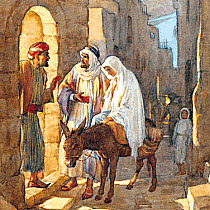 populous of Judea was required to return to the hometowns of the man of the house for the purpose of a census…a census for the specific purpose of later assessing taxes, and this was the reason for the less than timely travels of Joseph and Mary.
populous of Judea was required to return to the hometowns of the man of the house for the purpose of a census…a census for the specific purpose of later assessing taxes, and this was the reason for the less than timely travels of Joseph and Mary.
From their home in Nazareth, this somewhat older man, Joseph and his, by some accounts teenage woman or wife who was, at the time, nearly nine months pregnant, made the 80 mile journey from their home, to his town of birth…Bethlehem…to adhere to the political law of the day and be counted for the purpose of later tax assessments by the Romans.
But that is not where the politics of the first Christmas end…far from it in fact.
Along the way, magi from the east had been traveling, mostly by night and not just because they were following a star but also because, in their quest, they would surely cross paths with those whose purposes were more political in nature than was their own and by traveling at night, they could best avoid the bulk of them.
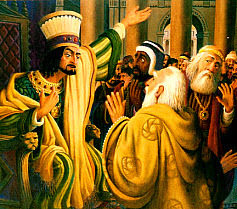 This part of their plan was working until, as they neared the end of their search, they stopped and made contact with Herod…Herod the Great was the King of Judea as appointed by the Romans…and ask his assistance in finding the new King of the Jews. According to the biblical story, Herod sent the magi on their way as they had told the King they were bound for Bethlehem.
This part of their plan was working until, as they neared the end of their search, they stopped and made contact with Herod…Herod the Great was the King of Judea as appointed by the Romans…and ask his assistance in finding the new King of the Jews. According to the biblical story, Herod sent the magi on their way as they had told the King they were bound for Bethlehem.
Ahhhh…more politics.
Herod was comfortable in his position as the King of Judea and the lifestyle it afforded him and most certainly did not want to lose that role to some Jewish newborn and thus, to protect his political station, he ordered what has been Biblically called the Massacre of the Innocents, an event for which there is no historical or archeological basis, and a recounting of only found in the Book of Matthew but nonetheless, it has become a well-known part of that first Christmas story.
According to Matthew 2:16 16-18…”When [the Magi] had gone, an angel of the Lord appeared to Joseph in a dream. Get up, he said, take the child and his mother and escape to Egypt. Stay there until I tell you, for Herod is going to search for the child 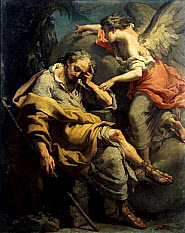 to kill him. So he got up, took the child and his mother during the night and left for Egypt, where he stayed until the death of Herod. And so was fulfilled what the Lord had said through the prophet: “Out of Egypt I called my son.” When Herod realized that he had been outwitted by the Magi, he was furious, and he gave orders to kill all the boys in Bethlehem and its vicinity who were two years old or under, in accordance with the time he had learned from the Magi. Then what was said through the prophet Jeremiah was fulfilled: “A voice is heard in Ramah, weeping and great mourning, Rachel weeping for her children and refusing to be comforted, because they are no more.”
to kill him. So he got up, took the child and his mother during the night and left for Egypt, where he stayed until the death of Herod. And so was fulfilled what the Lord had said through the prophet: “Out of Egypt I called my son.” When Herod realized that he had been outwitted by the Magi, he was furious, and he gave orders to kill all the boys in Bethlehem and its vicinity who were two years old or under, in accordance with the time he had learned from the Magi. Then what was said through the prophet Jeremiah was fulfilled: “A voice is heard in Ramah, weeping and great mourning, Rachel weeping for her children and refusing to be comforted, because they are no more.”
In this passage, we find yet two more instances of politics in play.
First, that Joseph, Mary and their child, Jesus, fled Judea to live in Egypt as, in today’s vernacular, political refugees where they stayed until the death of Herod which, by historical accounts, was approximately 2 years later upon which they finally returned to Nazareth.
The second being that the magi, who had traveled far, were not there, as the biblical story has been translated, in witness at the time of the birth of Jesus. Herod had commanded 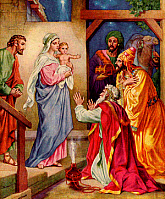 that all male children, up to two years of age…”in accordance with the time he had learned from the Magi,” that a new King was being born and so it seems, that rather than being present at the date of birth, the magi didn’t see Jesus until he was possibly two years old which may well have been in Nazareth rather than in Bethlehem as, at the time of the birth of Jesus, the order to kill male children had not yet been given.
that all male children, up to two years of age…”in accordance with the time he had learned from the Magi,” that a new King was being born and so it seems, that rather than being present at the date of birth, the magi didn’t see Jesus until he was possibly two years old which may well have been in Nazareth rather than in Bethlehem as, at the time of the birth of Jesus, the order to kill male children had not yet been given.
Note that Biblically, as written in Matthew…”Now after Jesus was born in Bethlehem of Judea in the days of Herod the king, behold, magi from the east arrived in Jerusalem, saying, “Where is He who has been born King of the Jews? For we saw His star in the east, and have come to worship Him.”
AFTER Jesus was born and..”Where is he who HAS been born” are the two important clues here that show the notion of the magi being present WHEN Jesus was born is a more romantic notion comprised of compressing the timeline for the sake of the story itself.
Yet another clue to this is found in Matthew 2:11 where he wrote… “And when they [the wise men] had come into the house, they saw the young child with Mary his mother, and fell down and worshipped him.”
The magi too, after their visit to the home of the baby Jesus, were politically aware that their lives were in danger, and so as not to tip off Herod as to the exact whereabouts of the new King, they left Judea by different routes to return to their respective homelands, and avoid Herod and his political agenda altogether.
As an aside, why three magi? The biblical scripture never mentions the number of magi that traveled to see Jesus, and we assume there were three based on the three gifts. The names Melchior, Caspar and Balthazar came later as no names associated with the magi were ever mentioned in the gospels.To be honest, the true number of magi is, and always will remain, unknown.
It is clear to see that the first Christmas, as recounted by Matthew in the Bible, revolved around the politics of the day, but that is not where politics leaves the traditions we now celebrate as Christmas.
The very date of the birth of Jesus as we celebrate it on December 25th is not historically accurate, and while Matthew never gives us a precise date for the birth, he does leave us some very important clues.
Matthew wrote that the night that Jesus was born, shepherds tended their flocks in the fields where they lay. Decem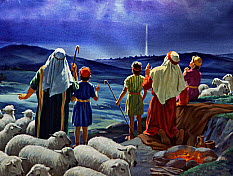 ber is cold and rainy in Israel today, and would have been the same in Judea at the time of the birth of Jesus so we can deduce by that, shepherds worth their salt, would have sought shelter for their flocks at night and not been in open fields.
ber is cold and rainy in Israel today, and would have been the same in Judea at the time of the birth of Jesus so we can deduce by that, shepherds worth their salt, would have sought shelter for their flocks at night and not been in open fields.
We can also deduce that taking a census, as was the reason for Joseph and Mary to have traveled to Bethlehem, would have been counter-productive during the cold and rainy season as not every person would have been able to have made the trip.
We see in Luke 24-36 that the mother of John the Baptist was in her 6th month of pregnancy when Jesus was conceived. In Luke 1:5, we learn that John’s father, Zacharias, was a priest serving in the Jerusalem temple during the time of Abijah, a Holy celebration that historical documents place in mid-June of that year, and w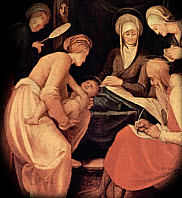 hile there, was visited by angels who told him that his wife, Elizabeth, would later conceive a child. Given slow travel times in biblical days, it would be correct to assume that upon his return to his home, near the end of June, Zacharias and Elizabeth conceived the child that would become John the Baptist.
hile there, was visited by angels who told him that his wife, Elizabeth, would later conceive a child. Given slow travel times in biblical days, it would be correct to assume that upon his return to his home, near the end of June, Zacharias and Elizabeth conceived the child that would become John the Baptist.
Given these clues regarding the timeline, if Elizabeth was 6 months pregnant when Jesus was conceived, that would put the immaculate conception near late December of that year…the conception of Jesus, and not his birth…thus making his birth some 9 months later…in late September of the following year.
Another aside…could it possibly be that in Biblical times, a person’s “birthday” was marked not by the date on which that person was born, but on the date they were conceived? Tradition has it that John the Baptist’s birthday was June 24th or roughly the time when his father returned home and scholars believe he was conceived, and Jesus’ birthday, December 25th would have been nearly 6 months to the day after the conception of John. Food for thought although the date associated with the birth of John could have also been set by political need simply to string out important dates so as to have Christian celebrations scattered throughout the calendar.
Here is where we discover the last piece of the political puzzle surrounding the earliest observances of Christmas in that as Christianity began to emerge as a true religion, its primary rival was Paganism as practiced by the Romans whose holiday of Saturnalia, a week long period of lawlessness celebrated between December 17th-25th, and was the greatest celebration of the year.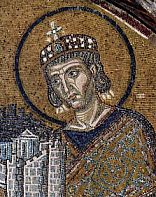
Celebrating Christmas, on December 25th, was a political move first made by Roman Emperor Constantine in 336AD. A few years later, Pope Julius I officially declared that the birth of Jesus would be celebrated on the 25th December. Dionysus Exiguus, a 6th century monk codified that date as a way to incorporate other cultural celebrations. Jews had a festival of lights around this time of year annually while Germans held an annual yule festival. Celtic legends connected the winter solstice with Balder, the Scandinavian sun god who was struck down by an arrow made of mistletoe and, of course, there was Saturnalia.
Political motives, mixed with the leadership of the new religion of Christianity decided that trying to recruit the Pagans into Christianity would best be done if they were allowed to continue their Pagan rituals followed directly by a new celebration.
In 1687, the Reverend Increase Mather of Boston wrote…“the early Christians who first 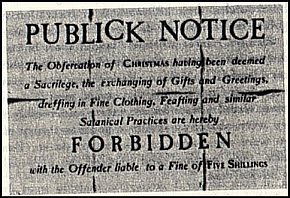 observed the Nativity on December 25th did not do so thinking that Christ was born in that Month, but because the Heathens’ Saturnalia was at that time kept in Rome, and they were willing to have those Pagan Holidays metamorphosed into Christian ones,” and even that did not gain full acceptance for hundreds of years. In fact, in 17th century in Massachusetts, any celebration of Christmas was banned between 1659 and 1681 strictly because of its association with Paganism.
observed the Nativity on December 25th did not do so thinking that Christ was born in that Month, but because the Heathens’ Saturnalia was at that time kept in Rome, and they were willing to have those Pagan Holidays metamorphosed into Christian ones,” and even that did not gain full acceptance for hundreds of years. In fact, in 17th century in Massachusetts, any celebration of Christmas was banned between 1659 and 1681 strictly because of its association with Paganism.
To be sure, it wasn’t until the mid-19th century that the celebration of Christmas became the mainstream traditional celebration we recognize today and that notion of Christmas, and the spirit of it was placed into our current mindset by an English author, in 1843 with a short story titled, “A Christmas Carol.”
It doesn’t really matter when, what date, we celebrate as Christmas…what matters is what we celebrate, and that we celebrate…a birth, a new beginning, a baby who would grow and teach and change the world, but one thing is clear…Christmas, from the birth of that one particular baby to placing a nativity scene in a public park, has been a political hot potato since day one, and after more than 2000 years, we should not expect that to change.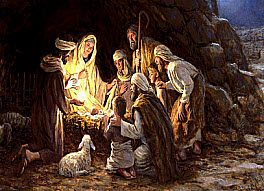
While the traditions involved in our Christmas celebrations have evolved over the centuries, the story we celebrate hasn’t changed much except for semantics due to numerous various translations of Biblical texts , so when someone tells you that politics and Christmas don’t go together…you can now tell them that were it not for politics, as they were in a place half way around the world some 2000 plus years ago, the story of the first Christmas would have been far, far different that the one we have come to know.
Copyright © 2017 Craig Andresen / thenationalpatriot.com
****************************************************************
RIGHT SIDE PATRIOTS…LIVE!
Don’t miss our CHRISTMAS SPECIAL this Friday evening, December 22nd from 7 to 9pm EST, as we discuss the politics of the very first Christmas, and White House Christmas traditions.
Hope you can tune in at: http://listen.samcloud.com/w/73891/American-Political-Radio#history

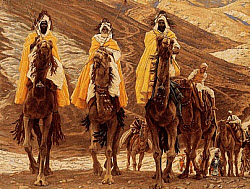





After losing what should have been a pretty winnable election, it would make sense for Hillary Clinton to sit down with her team and assess what happened and why they lost. It would be useful information for anybody that wants to challenge Trump in 2020. However, that kind of self-reflection would be grounds for accepting responsibility for something and Hillary Clinton does not do that.
Instead, Hillary chose to blame James Comey. In revealing what is either a stunning lack of self-awareness or just her innate penchant for blaming others for her troubles, she decided to attempt to make the case to donors the reason she lost states such as Pennsylvania, Michigan, Wisconsin and Ohio was due to letters sent by FBI Director James Comey to members of Congress about her emails.